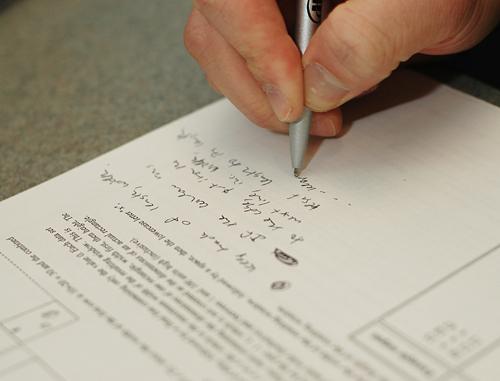UI team in the hunt for title in computing
February 1, 2007
One computer, five hours, pencils, paper and three people. That’s all the University’s programming team has to win one of the most prestigious programming competitions for college students – and they are set to do it.
Members of the team are preparing for their journey to Tokyo to compete in the 31st Annual ACM International Collegiate Programming Contest World Finals. Coached by Marsha Woodbury, professor of computer science, the team has done a lot to get to the finals, but still has a great deal of work to do.
Woodbury said anyone who wanted to be on one of the three programming teams representing the University first had to go through a placement competition against other University students. Once the students were selected and the three teams were decided, they all participated in the regional competition, held at the University in the Siebel Center, 201 N. Goodwin Ave., this year.
But the University’s programming team almost lost on their home court, missing a chance at the world finals, said Woodbury.
“There had been a mistake in the judging, and the University won the appeal. They came in second in our regional,” Woodbury said. “The first two teams get to go to Japan. But this is not the first time we have gone to the world finals.”
Get The Daily Illini in your inbox!
Woodbury said a team from the University has qualified for the world finals three times out of the last four years, and has traveled to places such as Prague, Czech Republic; Shanghai, China; and Beverly Hills, Calif., to compete.
The team will travel to Tokyo from March 12-16, and is working hard preparing to compete against 85 teams from around the world.
The team is given one computer per three-person team, pencils, paper and five hours to solve a number of programming problems. The team that solves the most problems correctly in the fastest time wins.
Jacob Lee, team member and junior in Engineering, said the team is practicing about once a week and using a variety of methods to prepare.
“We are doing a lot of problems from previous years’ finals,” Lee said. “We are going to read up on certain algorithms and programming techniques. Then, get together for a few practice sessions and say, ‘Okay we have 5 hours. Let’s do this.'”
Jonathan Ray, team member and senior in Engineering, has never competed in the contest before. But, he knew some people who have participated and it sparked his interest.
Ray said that regionals were not stressful and it was fun to participate.
“It was an all-day contest with free food,” he said.
The third team member, Jesse Beder, graduate student, brings something interesting to the team as well. He has competed in the competition twice – representing the University of Wisconsin-Madison, where he earned his undergraduate degree in mathematics.
Now Beder is switching teams and competing for the University, but admits he hopes to see friends from Madison at the Tokyo contest.
The team’s last goal before going to Tokyo is finding the money to get there.
Woodbury said the team has made a grant request to the SORF Board. Also, Chris Mullen, an alumnus who had previously participated, made a donation of $1,000. His employer, Deloitte Touche Tohmatsu, also matched the $1,000.
But once the team gets to Tokyo, all expenses are paid for by IBM.
Woodbury said the most amazing thing about the team is they are incredibly calm people, in and out of the competition.
“I really praise these students because they are really self-motivated and self-directed,” Woodbury said. “They are outstanding students.”







